
Updated How to Import and Export Videos in Adobe Premiere

Unlocking Adobe Premiere: A Step-by-Step Guide to Video Import and Export
How to Import and Export Videos in Adobe Premiere

Benjamin Arango
Mar 27, 2024• Proven solutions
Adobe Premiere Pro offers different paths to importing and exporting videos. Here we mainly discuss how to import and export media files in Adobe Premiere Pro.
Learn more tips, tricks and hacks of Premiere for accelerating video editing.
This is a basic tutorial about Adobe Premiere, professional video editing software. However, if video editing is new to you, consider Wondershare Filmora , which is a powerful but easy-to-use tool for users just starting out. Download the free trial version below.
 Download Mac Version ](https://tools.techidaily.com/wondershare/filmora/download/ )
Download Mac Version ](https://tools.techidaily.com/wondershare/filmora/download/ )
Importing
There are two main ways to import media into Premiere, the import command and the media browser. They do things slightly differently and have uses they are both best suited to, here we will look at the process itself and which method to use in a given situation.
1. Import Command
This is a straightforward command that works like most other programs, and is accessed from the file menu, or via the Control+I shortcut on the PC or Command+I on the Mac. You can also double click an empty area of the project panel to automatically open the import dialogue.
Whichever way you access it, you get the standard for the platform import dialogue box we see here.
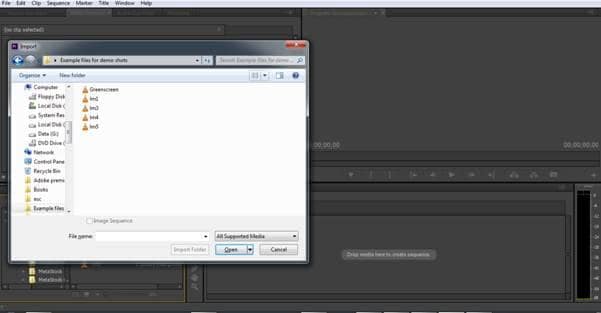
This method of importing is best suited to self-contained media such as audio or graphics, or video files such as MP4 that are single files themselves, whose location on your computer you know so you can navigate to them easily. This is not the way to import videos from cameras, as they invariably create complex file and folder arrangements that make choosing the correct files difficult. This is where you would opt for the media browser method instead.
2. Media Browser
Whilst on the surface media browser appears to do the same job as the import command the way they carry out the task is somewhat different, media browser is designed to let you see the media created by cameras, and show you easy to understand icons and metadata rather than the intricate pattern of files and folders they use. This makes picking the correct clip from a selection much easier, with metadata showing you date and duration as well as file type.
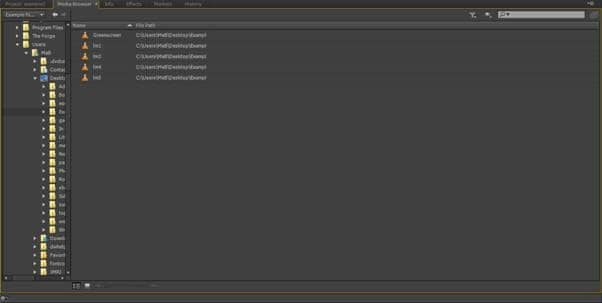
The media browser panel is found in the project panel, which on the standard layout is the bottom left corner, and can also be accessed by the Shift+8 shortcut. As you can see from the screenshot it works like an operating system file browser and allows you to navigate through the file directories of hard drives and removable media connected to the system.
One of the benefits of media browser is to narrow down the type of media being shown, so you can set to avchd for instance and it will display just that type of file in a given location. Because many projects use media from different sources this can be a real boon to finding the right file within a list.
File Types
Media browser displays more or less any file there is in a given location, and importing is simply a matter of selecting the correct file and double clicking it or right clicking and selecting import from the menu. You can select multiple files at once by holding down shift and import them all together if needed.
There are some exceptions to this, however, despite having a huge number of file types supported natively within Premiere, you will sometimes run into files that are not supported, FLV and MKV files being the most common ones, but this is not the end of the world and there is a simple solution.
Wondershare Video Converter Ultimate offers an easy way to convert any file you may have into media that Premiere can use quickly and efficiently, and is a great tool to have alongside premiere if you commonly work with multiple file types.
Exporting
The ultimate aim of any project is obviously to finish it and let others see the result of your creativity, and that means exporting your work into a format that is suitable for the medium you wish the project to be viewed on. Premiere offers a number of options regarding export, you can select an entire sequence to export as a single file for the web or disc, choose a single frame to post to a website, blog or to distribute through email, you can export just the audio, or just the video from a sequence, and if you have the right hardware, can export directly to tape or disk.
To export a project that closely matches the original media in quality and frame rates, often called a master copy, is very straightforward in Premiere, with the sequence selected, either in the Timeline Panel or the Project Panel, you simply use the File > Export > Media path :
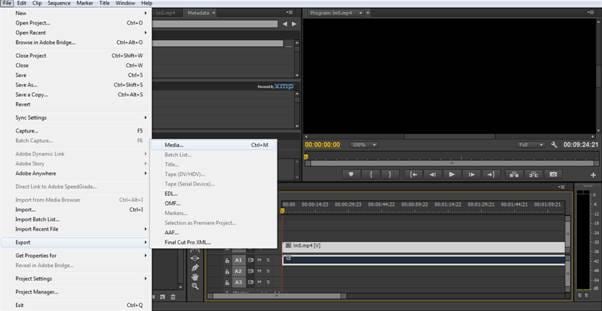
Which opens the media export dialogue.
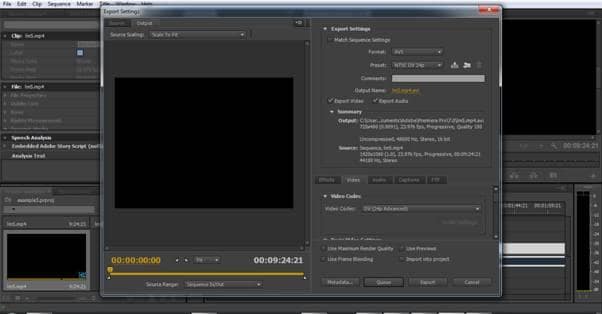
Selecting ‘Match Sequence Settings’ here creates a finished file that matches the quality of the original source media. Then you simply choose a suitable name for the file in the Output Name field, and click export. This creates in essence a digital clone of the sequence, and best practice is to always do this for any project, however, for many projects, this is not necessarily the format you would want the final product to be in, those concentrating on YouTube output, or someone wanting to author a DVD for instance will need other options.
Thankfully Premiere caters here as well. Instead of selecting the ‘Match Sequence Settings’ within export dialogue, you can click on the ‘Format’ field to change the type of file that is produced. What options here can vary depending on codecs installed, this screenshot shows only those that are included with the product for clarity.
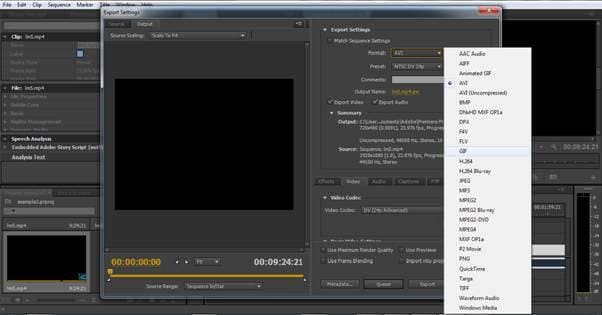
Depending on which format you choose. The preset below will allow you to choose a wide range of output settings to suit the intended platform. For instance, selecting format brings up a huge number of presets for various Tablets and Phones, but also for Vimeo and YouTube, which is why it is one of the most common output formats. Here’s a look at some of the presets available from the menu.
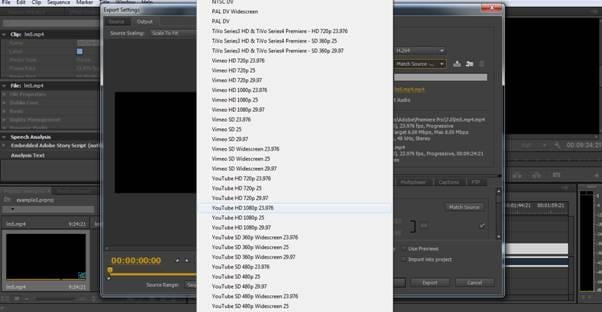
Once you choose a preset, you can further modify the parameters to suit the project you are working on and even save those as an additional custom preset for later projects should you wish. Again, choosing a suitable file name and clicking Export ends the process.
The other common requirement is for DVD or Blu-Ray files. Whilst you need access to the appropriate hardware to burn the disk, Premiere creates the file structure for that natively and you have two options here. Mpeg2 in either DVD or Blu-Ray form, or Blu-Ray. With high quality source material, the two formats are virtually indistinguishable in their final format, however, MPEG2 will be much quicker to render and is a good choice for most applications. Although does allow more content to fit into a given space, so it does have uses. Importing and exporting are the foundation of Premiere use, and as we have shown Premiere makes it very easy to do and produces the right file types for whatever your project is to be used for.
With the addition of Wondershare Video Converter Ultimate you have a workflow that can ingest and export any type of media file you will ever come across with the minimum of fuss.

Benjamin Arango
Benjamin Arango is a writer and a lover of all things video.
Follow @Benjamin Arango
Also read:
- [New] 2024 Approved The Essential How-To Sharing Videos From YouTube on Instagram
- [New] The Ultimate List of World Explorers on Youtube
- In 2024, From Noise to Masterpiece 10 Glitch Art Video Editing Apps for Mobile Devices
- In 2024, Top 6 Best Capture Cards for Nintendo Switch You Can Find
- In 2024, Ways To Find Unlocking Codes For Oppo A1x 5G Phones
- In-Depth Review of ManyCam's Game-Changing Recorder Tech
- İşletmeye Uygun Movavi Video Editing Software: Profesyonel Videografik Sistemleri
- Maximize Your Graphics Card Potential with Newly Available NVIDIA RTX 2N80 Super Driver Software - Optimal for Win10/Win11
- Mohu Blade TV Antenna Overview: Exceptional Quality, Modern Aesthetics, and Strong In-Home Reception Capabilities
- New Audio Fade Ins and Outs Made Easy 2 FCP Techniques
- Reverse TikTok Videos Like a Pro A Step-by-Step Tutorial
- The Blueprint for Flawless Video Conferences on Slack+Filmora
- Top 10 Famous Movies Made By Final Cut Pro
- What Sets Final Cut Pro Apart From Final Cut Express for 2024
- Title: Updated How to Import and Export Videos in Adobe Premiere
- Author: Giselle
- Created at : 2024-11-17 16:08:27
- Updated at : 2024-11-24 17:57:27
- Link: https://ai-vdieo-software.techidaily.com/updated-how-to-import-and-export-videos-in-adobe-premiere/
- License: This work is licensed under CC BY-NC-SA 4.0.